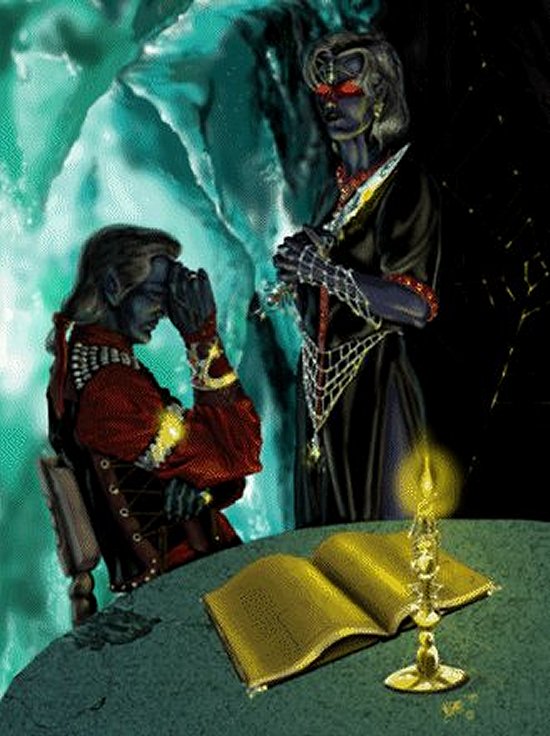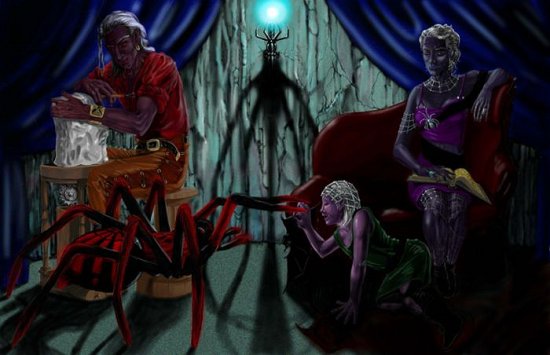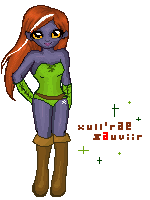
©2004 Lance W. Card
[ The information below is from an article on the WotC site, written by Sean K. Reynolds. Additional text from The Drow of the Underdark™ has been added in at appropriate places for further reference. ]
Most of the surface world knows little about the society of the dark elves except for a few stereotypes: Dominated by the female clerics of Lolth the Spider Queen, males are subservient, and slaves and magic are everywhere. For most of the surface world, that information is more than sufficient, but while these stereotypes are based in fact, they only scratch the surface of what life is like among the dark elves. Drow, like humans and other civilized beings, eat, fall in love, marry, raise children, and have families. In fact, because dark elves have long lifespans and drow society is frequented by upheavals, relations among the drow are usually more complex than a typical human family.
- Gender Roles
Lolth is the patron goddess of the drow, and they owe their existence in (or, to be precise, their banishment to) the Underdark to her. Given such an involvement in the origin of the dark elves, it is unsurprising that the majority of drow cities, and thus the majority of all drow, pay homage to the Spider Queen. With her patronage comes her rigid dogma of female superiority and male inferiority. In these societies, females control almost all of the power, leaving males to pick at the scraps. Traditionally, females enter the clergy and serve Lolth as her priestesses, while males enter the military or (rarely) study wizardry. Priestesses are trained in the arts of war, and often squadrons and armies are led directly by the foul clerics of the Spider Queen, but normally they keep themselves out of harm's way and give orders to experienced male officers, some of which are kept in check by physical or magical threats or even outright magical domination.
Wizardry is the only real way a male in a Lolthian society can gain any true power. Even the most experienced male general and veteran of many conflicts might be killed for an accidental insult to a spider-priestess, but a wizard of equal status is far more valuable simply because they are rarer and more useful. Still, even the most talented male wizard is technically a social inferior to the lowest female cleric -- a fact that the male wizards resent greatly. In a world where they are doomed to servitude because of an accident of their gender, a male wizard who can transcend space and time and who must bow and scrape to female clerics who can barely muster the power to mend a scraped knee leads a frustrated existence.
The above describes the majority of dark elf cities, but a not insignificant number of drow cities have an entirely different societal structure. For example, the city of Sshamath is ruled by male wizards, with female clerics of Lolth shunted into lesser roles. (Sshamath's nature came about due to a larger number of males born in the past few centuries, coupled with increased research into old magic sites and a temporary disruption in clerical magic.) Given that Sshamath has survived despite being a thorn in the side of Lolth's official view on drow society means that other unusual drow societies may exist, such as those ruled by the military or hereditary nobles regardless of faith.
However, most drow societies reflect the deity they venerate. Some may be built around the philosophy of Kiaransalee, a minor drow goddess of undeath and vengeance. In such a place, the drow in power may be those with the ability to command and create undead, or are undead themselves. Vhaeraun, a rising power of drow males, thievery, and life on the world's surface, has a more balanced view of the sexes, seeking equality but requiring the downfall of Lolth's existing matriarchy. The settlements his followers have been creating on the surface world have a much more equal distribution of power between males and females, although it is slightly skewed in favor of males because of old grudges against females and because there are fewer females among the Vhaeraunian faithful. Ghaunadaur, an old and bizarre deity of slimes and oozes that resents Lolth's usurpation of Underdark territory, cares little for whether his followers are male or female as long as they serve his interests. While no actual drow cities are known to officially endorse Ghaunadaur, small settlements and cults do exist and have hierarchies based entirely on power and loyalty. Most unusual of all of the drow cultures are those tied to Eilistraee, Lolth's benevolent daughter (and Vhaeraun's sister), who is the patron of all good drow and especially those who wish to live peacefully with the other beings on the surface world. Eilistraee's followers usually must hide within the cities of the Spider Queen, but those fortunate to live in a place where their faith can be expressed enjoy a gender-equal society like those of the Vhaeraunian drow, except without the taint of evil, vengeance, and conquest that her family's followers carry with them. But the majority follow Lolth's teachings, and the remainder of this report assumes a Lolthian city.
- Social Rankings
Most drow societies have some sort of noble class, as social station is the most important thing in the world of the drow. In a Lolth-dominated society, the nobility consists of powerful, matriarchal Houses, with females holding all positions of power and responsibility in government, the military, and in the home.
Such Houses are led by a Matron Mother, who is most often the senior female priestess. The Matron's rule is absolute within the House, enforced by the priestesses beneath her (usually her daughters). All females of the mother's blood, in order of their age, follow in rank, although they wield no authority until they are trained and of age. The Matron's position only changes upon her death--often at the hands of her eldest daughter.
Below the daughters come the male officers of the House: the Weapons Master (leader of the fighters), (chief) House Wizard, and the Patron (current consort of the Matron Mother). These ranks may be combined, and even held by the traditional next rank down in the heirarchy: the male heirs of the House.
Male heirs are also ranked by age: Elderboy, Secondboy, Thirdboy, and so on (though the title of Thirdboy would technically fall to the fourth male born, as the third son is always sacrificed to Lolth upon birth; the one exception to this rule is if one of the elder males is killed before the third male child is born). They are not allowed to look at the faces of other drow, or speak unless spoken to or bidden. This treatment teaches them their subordinate place in drow society.
The next tier within the House heirarchy are the "war-leaders" of the House (veteran warriors, who lead House patrols, attack squads, and guards, under the command of the Weapons Master), and the House mages (under the command of the House Wizard).
Beneath these "blood" members and officials of the House rank is common warriors, its craftspeople, its servants, and its slaves. All ranks are decreed by, and can be changed at the whim of, the Matron Mother.
Unlike in human and other societies, drow nobles are significantly different than commoners, at least in terms of magical ability. For example, most drow nobles develop the ability to detect magic, levitate, or sense the nature of other beings through sheer force of will. This difference probably stems from the origins of most drow cities, which are founded by exceptional dark elf individuals or families, who then pass on their exceptional traits to their offspring, which become the noble class of the growing city. These abilities usually breed true, so commoners taken into the noble families to improve the bloodlines or expand the familiy can be parents to nobles with powers even though they themselves lack those abilities. Those rare nobles whose bloodlines are so thin as to not manifest the noble traits often carry magical tokens to make up for this lack; more common among the nobles are magic items that expand their abilities, such as in frequency, power, or versatility.
Unless wishing to be incognito, most drow nobles dress appropriately to their station, with fine clothing, superior equipment (even for dark elves, of which the lowest soldier usually has at least a masterwork weapon), and an almost-palpable aura of superiority, menace, and power. Commoners learn quickly to recognize an approaching noble and to stay out of their way when they are in a bad mood. In traditional drow society, commoners are only slightly less expendable than slaves; if given a choice of sacrificing a slave or a drow commoner to further a goal, a dark elf noble will choose the slave, but if the only way to succeed is to eliminate a drow commoner, that commoner is as good as dead.
Those with unusual talent in war or magic can attain status similar to that of a noble, and such individuals are often adopted into a noble's household to increase the prestige and power of that house. Weapon Master Zaknafein, father of Drizzt Do'Urden, was such an individual. He was born a commoner but permanently attached to House Do'Urden because of his fantastic skill with weapons; he was even allowed to bear the Do'Urden name, and because of his time as the consort of Matron Do'Urden, his children are full noble members of the house.
In most cases, the best a commoner can aspire to is to be the consort of an influential noble. Such a position brings great privilege and the opportunity to live in luxury without need to work. Unfortunately such appointments don't last long since the noble may grow tired of the consort, or other members of the household may use the consort as a pawn in their sick and deadly games against each other. The uplifted commoner, lacking the depth of experience in intrigue that the true nobles have, may insult their mate or another member of the house, which usually results in torture and death or, if the noble is lenient, expulsion from the house and a return to a commoner's life in shame.
Barring the possibility of becoming an actual consort, commoners still compete ruthlessly to place their daughters and sons into some kind of service to a noble family, for any ties to a noble family equate to some form of status or power, at least where the feuds between commoner families are concerned. Even the lowliest drow commoner is always plotting some way to grab a little more wealth, a little more respect, and a little more power. Jealousy, avarice, and long-nurtured grudges poison a drow commoner's every waking thought.
There is another major social group within every drow society that offers those who were born male--or of other lesser social standing--hope and something to strive towards: The Merchant Clans. Though the ruling priestesses within Lolthian society outwardly repudiate the worth of such Clans, no one can truly deny that they are vital to the survival of the drow.
Merchant clans vary in organization. They are usually headed by an "inner ring" or council of the most experienced and/or wealthy merchant members, and hence are usually led by males (the "demeaning" and dangerous occupation of trading with outsiders is an almost exclusively male one). The membership of the inner ring of a given merchant clan consists primarily of male wizards who have either passed or evaded The Test. Removed as they are from drow society at large, the merchant clans have no compunction about dealing with the surface world and other Underdark societies. In fact, a great number of the "second ring", or managers, are non-drow of various races.
The lowest rank in the merchant clan, the "assets", are nearly all non-drow. These are the laborers and soldiery of the merchant house. Together, the merchant clans form the trade links with the outside world that enables the Noble Houses to survive.
- Work
Like the people on the surface, most dark elves have some sort of work that keeps them busy, whether farming, crafting items, working in a shop, or other similarly mundane tasks. Most go about their work day in a similar fashion to surface folk, maintaining old feuds, engaging in gossip, and trying to support themselves and their families. Hovering above this mundane façade are the shadows of the Spider Queen's clerics, who nominally are expected to compensate merchants for their goods, but are fully within their rights to claim whatever they want in the name of the Spider Queen. Many times has a jeweler or gemsmith been reduced to poverty because his works are so greatly desired by clerics unwilling to pay; after mortgaging their homes and selling off their possessions to stay in business, these poor souls are often consigned to work in the temples or noble houses as little more than talented slaves to pay off their debts. Such cruel irony is a delicious form of humor to the spider-priestesses.
Unlike surface communities, drow cities never have a problem with unemployment or homelessness. Those drow put into such a situation quickly become victims, whether of slavery, murder sport by bored nobles, sacrifices to Lolth, or indiscriminate violence practiced against those who have no house, church, or family to protect them. Because of this grim spectre looming near all poor drow, most choose to sign on with the military forces of the city or a noble house, since they can always use more soldiers, no matter how poorly trained. After all, life as a soldier at least provides meals and shelter, and, despite the occasional risk of death in combat, it is a far safer choice than living homeless in the streets where the spider-clerics walk.

- Love
Among the cruel and self-centered dark elves, love is practically unheard of. Long-standing mates live together for practical reasons, not romantic ones, such as complementary careers, physical attractiveness, a legacy of producing many female heirs, political influence, and so on. Families remain together only because it provides a shield against enemies from outside the family (even though intra-family rivalries can be just as deadly as outside threats). Parents see children as a means to more power and are willing to sacrifice those children (males moreso than females) if it proves the key to greater power. Children quickly lose their innocent naivety and learn the horrible truths of drow society, thereafter seeing their parents as strict tormenters who nonetheless keep the world's predators at bay until the children can fend for themselves. In the rare cases where mated drow develop some affection for each other, it is usually when the male is an excellent physical specimen, has provided excellent service, and has never caused embarrassment to the female. In these cases, the bond is more like that of a spoiled or insensitive human matron and her pampered lapdog; the male is a cherished pet that will still be put down if it misbehaves too much. Even rarer is an honest bond of love between a parent and child, which is usually only possible if the parent is somehow resistant to the pressures of drow society and passes this trait on to the child. Zaknafein and his son Drizzt shared such a bond; the father's disdain of his own cruel race and wishes for a different life both existed in the son as well, and once they recognized their shared secret, they became close like human families are wont to do. Unfortunately for this famous pair, their aversion to the drow way of life was discovered (all too common, as living in secrecy is extremely taxing) and Zaknafein was sacrificed to Lolth.
- Courting
Lolthian drow have a matriarchal society where inheritance of property, titles, and birthright pass from mother to daughter. Bearing children is a sign of the power of femininity and an ability that men can never have. Because of these factors, drow women normally want to have as many children as their slow elven birthrate allows. Because the females have all the control, relationships between men and women have few protocols, and it is the women who decide who their lovers are and how long the relationship lasts. The concept of courting as understood by humans and other surface races is almost unknown to the drow; in a society where males are valueless and life is worth little, having a lengthy process of becoming involved with another person is inefficient. Furthermore, the concept of a male pursuing a coy or disinterested female is an aberration, for it puts the male in a position of power and the female in a subservient role. Any male that practiced such a tactic would quickly be tortured and sacrificed to the Spider Queen for his impertinence. Instead, "courting" is the responsibility of the females, who pick their mates like selecting a good breeding animal, and the males are expected to comply. Many times the selection of a mate is the start of a deadly rivalry between different females as they fight over the choicest specimens. These males usually end up the worse for wear in the deadly games of the female, and more than once has a female "given up" on a male only to leave him skinned and dead in her rival's bedchamber.
- Marriage
In a culture where females rule and males are little more than slaves, the idea of a female legally attaching herself to a single male for the rest of her life is an absurd concept. Marriage does not exist in Lolth's cities. Females take whatever consorts they wish and choose a new one when they grow bored with the old. If the dark elves could more easily fall in love, things might be different, but such concepts are ground out of the drow very early in life by the teachings of the Spider Queen.

©2004 Lance W. Card
- Family
Dark elves live for several hundred years, and females have the capability to bear children at least every hundred years. Because of this, drow families tend to be larger than those of surface elves, who breed more slowly (either as a function of their greater lifespan as compared to the drow or in some interest in not overpopulating their lands). For example, Drizzt Do'Urden had five siblings, although one brother was killed on the night he was born (by Drizzt's other brother, oddly enough). These large families help relieve the parents of the responsibility of raising the younger children (which is put upon the elder siblings). Rivalries between siblings can be competitive and deadly (as Drizzt's brothers prove), for just as females are superior to males, firstborn children are superior to those born later.
With their long lifespan, dark elves have the possibility of having several generations within one family alive at the same time. Although this is reduced somewhat because of violence in drow society and the plots of various family members against each other, most commoner families have grandparents and great-grandparents still alive and living with the youngest members of the household. As dark elves remain viable until the last few years (and once they grow feeble they are usually killed), these great-elders are not a burden upon the family and act as their guides, teachers, lorekeepers, and rememberers of old grudges. A very old member of a family is someone to be respected and feared, for they have survived Lolth's games for centuries, having grown and adapted to thrive in an environment of treachery and chaos.
Drow nobles are slightly different. With more to gain from the elimination of rivals and superiors, there are fewer incidents of multi-generation households among the nobles, and those in power usually keep their own siblings on a tight leash or kill them off. For example, nothing is known of Matron Malice Do'Urden's aunts or her sisters, all of whom reasonably ought to have been priestesses of significant power. In a family of six siblings, Drizzt knew no other family members except his own father, and only after he had become an adult.
- Child-Rearing
The drow are hardly doting parents. Among the noble class, a young drow is raised by tutors and elder siblings, and he or she normally sees his or her parents only a few times a year. Noble males are sent to the city's military or wizard academy depending upon their talents, while noble females enter the church and study the teachings of the Spider Queen, in each case seeing less and less of their families. (Because of the long lifespan of the drow and the number of years needed to reach maturity, these academies are like boarding schools and train the children for ten years or more, usually only letting them come home once a year for important family or religious meetings.) This practice only reinforces the drow's lack of affection for their own blood kin, for strong parent-child bonds cannot form when the parents are nearly absent from the child's life.
Among the commoners, it is a similar setup, although the parents usually don't have the resources to afford private tutors and so the responsibility for raising the child falls primarily upon the extended family. Talented commoners are recruited into the wizard or cleric academies, and the rest learn their parents' trades or are sent to military schooling. As with the nobles, the parents are always emotionally distant and often physically distant, too. If the children were permitted a more normal (by surface standards) home environment, they might have a chance to grow up without being emotionally stunted, and drow society might change for the better.
Page Last Updated October 10th, 2005
 EXCHANGE & AFFILIATE PROGRAM
EXCHANGE & AFFILIATE PROGRAM



Role Playing Games by RolePlayGateway


©2001-2022 All rights reserved Descent Into Darkness {Drow Campaign set in the Forgotten Realms}.
Everything within the domain name http://drowcampaign.roleplaynexus.com is protected by federal laws. Any duplication in part or in full, without written consent is a violation of these laws. The material such as graphics, backgrounds and music have their own Copyrights and were free to use with permission.
The material gathered and contained within is property and copyrighted to Wizards of the Coast, which is a Hasbro® owned company with its own Terms & Conditions to follow. If you wish to use any information on this site please contact the webmasters and all respective creditors mentioned in this statement. Thank you.
This site is for non-profit and commercial use is prohibited.
|
















